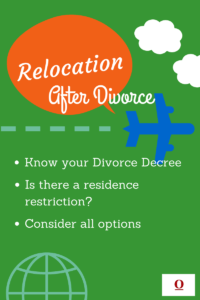
Moving After Your Divorce
In a divorce with children in Denton County, it is standard for the judge to include a residency restriction when the parents are joint managing conservators and both parents are currently living in the area. A residence restriction usually tells the parent who is the primary conservator of the children is restricted to living within Denton County and all of the counties that border Denton County. In a divorce decree or when talking with your lawyer, it may read as ‘Denton County and contiguous counties’. So what happens if one of the parents has to move out of that area?
Sometimes a move has to be made due to life circumstances and a family lawyer can help you navigate the new situation.
There are a few things to think about with that issue: which parent needs to move, where is that parent moving to, where does that parent live now?
The Possessory Parent
If you are the possessory parent and you need to move, first thing to do is to read your divorce decree. Your decree may include a provision that says that if you move from a certain area then the restriction on the primary residence parent is lifted. So, your move may affect more than just the new distance from your home to your kids’ home. Your move may allow the other parent to move wherever they want to move in the future.
Also, if you move after divorce and you move more than 100 miles away, your periods of possession will change to those specific to living over 100 miles away.
The Primary Residence Parent
If you are the primary residence parent and you need to move, start at the same place. Read your divorce decree and see what is included for moving after your divorce. Once you know what is included in your decree you will know what applies to you. If you have a residence restriction, and you need to move first consider where the possessory parent lives – have they moved outside of the area and lifted your restriction? Will the other parent agree to the move? If so, talk with a lawyer to make sure that agreement gets filed in your case as appropriate for your case. If the restriction still applies to you, you will need to consider asking the Court for permission to move. Seek advice from a family law attorney. Generally, the courts are not in favor of one parent moving children away from the other parent – it is the policy of the State of Texas to encourage contact with both parents. So, you may be looking at a situation where you can move, but you can’t move with the kids.
Over 100 miles
Standard Possession in the Family Code provides a specific possession schedule and options when the possessory parent lives or moves over 100 miles from the children. Weekends, spring break and summer time will change. Holidays won’t change based on distance between homes.
For advice for your situation and moving questions, call a family lawyer.
Jill O’Connell, 940-497-5454

